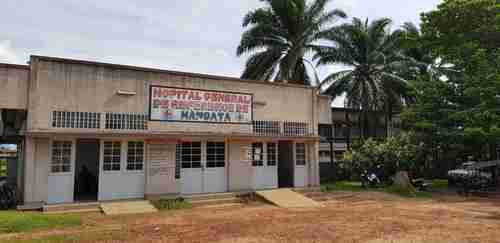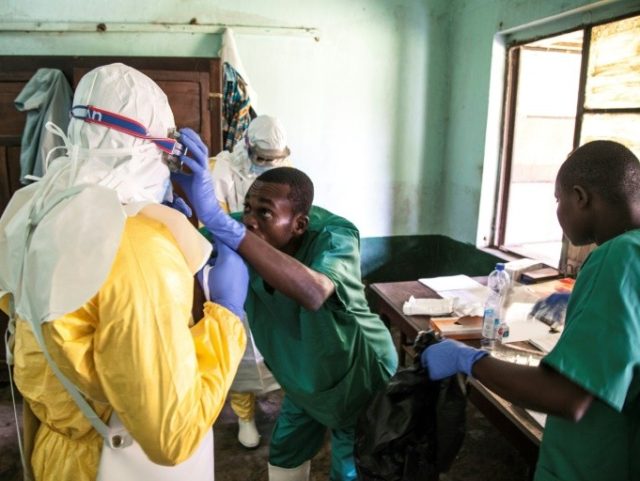This morning’s key headlines from GenerationalDynamics.com
- Ebola outbreak in major DR Congo city is called potentially ‘explosive’
- Applying lessons learned, WHO and MSF move quickly to contain Ebola outbreak
Ebola outbreak in major DR Congo city is called potentially ‘explosive’

Hospital in Mbandaka, DRC, where Ebola patients will be treated (WHO)
The Democratic Republic of Congo (DRC) was only marginally affected by the massive Ebola epidemic that struck eastern Africa (Sierra Leone, Liberia and Guinea) in 2014-2016. DRC itself has had its own Ebola outbreaks nine times since 1976, but all of them have occurred in rural villages, where they were easily contained.
What is different now is that a new Ebola outbreak has spread to a large, densely packed port city, with the possibility of rapid transmission within the city, as well as transmission along the Congo River to other countries.
As far as is currently known, the latest outbreak began in a small inland village called Ikoko Impenge, accessible only by motorbike. However, the outbreak only became known on May 8, when the DRC notified the World Health Organization (WHO) that there were two confirmed cases identified in another inland village, Bikoro. By Thursday, 23 deaths had occurred from Ebola cases in isolated rural villages, giving authorities a better chance of ring-fencing the outbreak before it could spread.
On Thursday, the World Health Organization announced that the Ebola outbreak had reached a “new phase,” as new Ebola cases were identified in Mbandaka, a large heavily populated urban city of about 1.2 million people. It is believed that the disease was brought to Mbandaka by two or three people who had attended the funeral of an Ebola victim in Bikoro.
The spread of the outbreak to Mbandaka is “explosive,” according to senior WHO official Peter Salama:
This is a major development in the outbreak. We have urban Ebola, which is a very different animal from rural Ebola. The potential for an explosive increase in cases is now there.
This puts a whole different lens on this outbreak and gives us increased urgency to move very quickly into Mbandaka to stop this new first sign of transmission.
There are two reasons why the outbreak in Mbandaka could be explosive:
- With a large, densely packed population, it will be easy for the virus to spread from person to person through human contact. Once infected, a person may not show symptoms for as many as 21 days, meaning that an infected person could infect many other people before he even knows of his own infection. It is theoretically possible that this has already happened, and that there will be many new cases in the next 3-4 weeks.
- Mbandaka is a port city on the Congo River, one of the longest and deepest rivers in the world, almost 3,000 miles long. With heavy traffic traveling from port to port along the river, the infection could spread to DRC’s capital city Kinshasa, with a population of 11.6 million, or it could spread to Brazzaville, population 2 million, the capital city of the neighboring country, the Republic of The Congo (sometimes called Congo-Brazzaville to distinguish it from DRC). Kinshasa and Brazzaville are situated opposite each other on the Congo River south of Mbandaka, and once Ebola reaches those two cities, it could spread further to other countries, or to other continents.
The World Health Organization on Friday is convening an emergency meeting to “consider the international risks” of the Ebola outbreak, and to decide whether to officially declare an international emergency. STAT News and BBC and Al Jazeera and World Health Organization and United Nations
Applying lessons learned, WHO and MSF move quickly to contain Ebola outbreak
The World Health Organization (WHO) was heavily criticized for moving too slowly to contain the Ebola outbreak in Guinea, Sierra Leone, and Liberia from 2014 to 2016, and so is now moving quickly to try to contain the new outbreak in DRC.
The Emergency Committee meeting that WHO is convening on Friday will decide whether to declare a “public health emergency of international concern,” which would mean getting access to more resources. So this step may be taken even though the outbreak is still confined to DRC.
Médecins Sans Frontières (MSF, Doctors Without Borders) has sent multiple teams to hospitals in Mbandaka and Bikoro. MSF is sending tons of supplies to Mbandaka, including medical kits; protection and disinfection kits containing isolation items such as protective clothing, gloves, and boots; logistical and hygiene kits containing items such as plastic sheets, chlorine spray kits, and water treatment kits; and palliative drugs to treat Ebola symptoms, such as strong painkillers, anti-anxiety drugs, and antibiotics.
A new experimental Ebola vaccine has been developed since the 2014-2016 outbreak, and MSF has 4,000 doses available to use to control the outbreak in Mbandaka. A vaccine cannot help someone who is already sick, but it will be used in conjunction with the methodology of “contact tracing.” Once a potential victim is identified, then contact tracing means that potential contacts are located, and their contacts are located, and so forth, and all of those people could be given the new vaccine.
However, it is not clear that any of these methods will prevent an explosive spread of Ebola. In 2014, Ebola spread rapidly in Liberia’s capital city Monrovia, particularly in the West Point slum area, with more than 70 000 people crowded together on a peninsula, with no running water, sanitation or garbage collection. If there is a similar slum area in Mbandaka, Kinshasa, or Brazzaville, then the spread could be equally massive. TRT World and Doctors Without Borders and AP and World Health Organization
Related Articles
- DR Congo boycotts its own international humanitarian conference for DR Congo (14-Apr-2018)
- DR Congo’s Joseph Kabila brings the art of power and corruption to new heights (24-Jul-2017)
- West Africa at significant economic risk as Ebola panic intensifies (16-Aug-2014)
- World Health Organization says Ebola outbreak is ‘in decline’ (30-Oct-2014)
- Forecasting the Ebola endgame and Global Risk (19-Oct-2014)
KEYS: Generational Dynamics, Democratic Republic of Congo, DRC, Ebola, Ikoko Impenge, Bikoro, Mbandaka, Kinshasa, Republic of The Congo, Brazzaville, World Health Organization, WHO, Peter Salama, Médecins Sans Frontières, Doctors Without Borders, MSF, Sierra Leone, Guinea, Liberia, Monrovia, West Point
Permanent web link to this article
Receive daily World View columns by e-mail

COMMENTS
Please let us know if you're having issues with commenting.